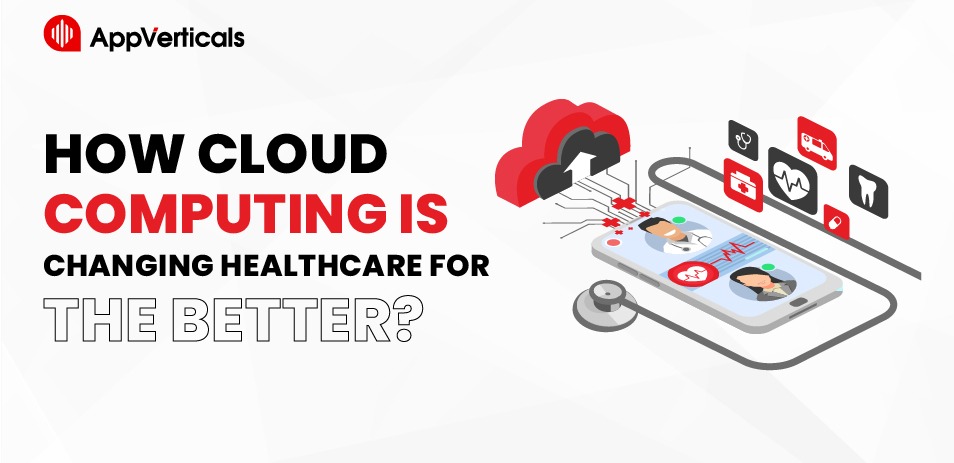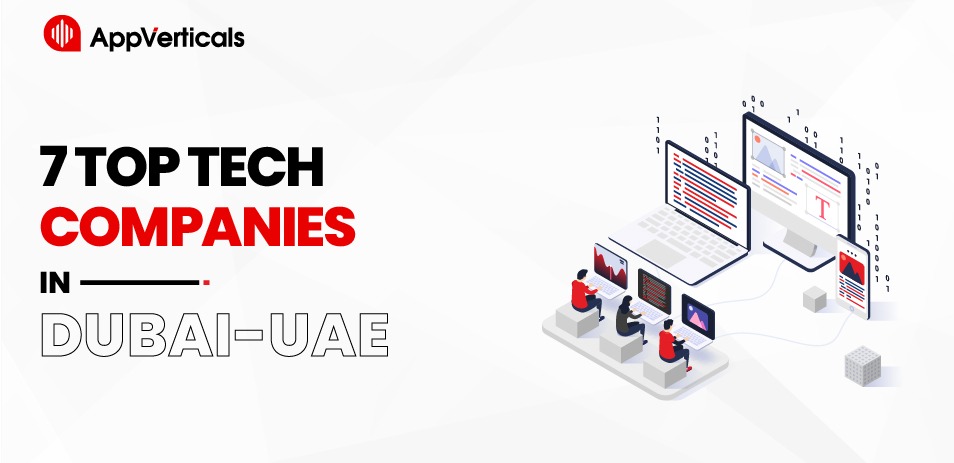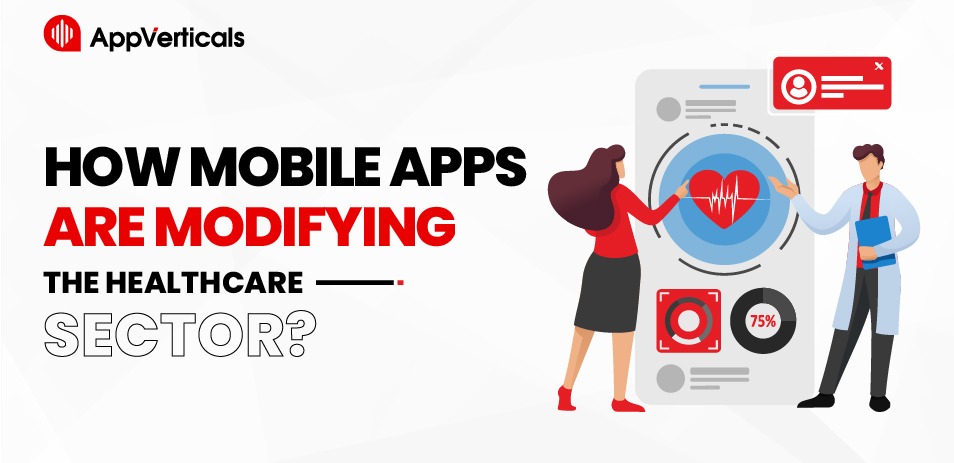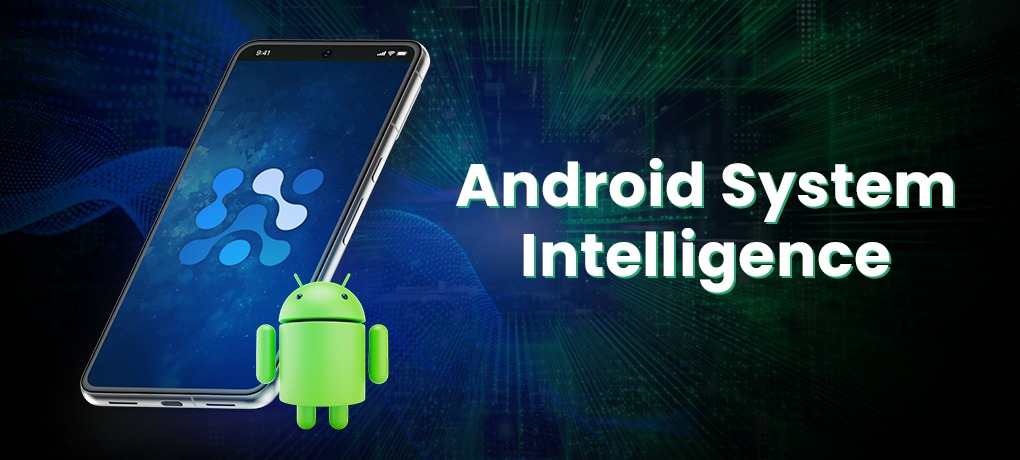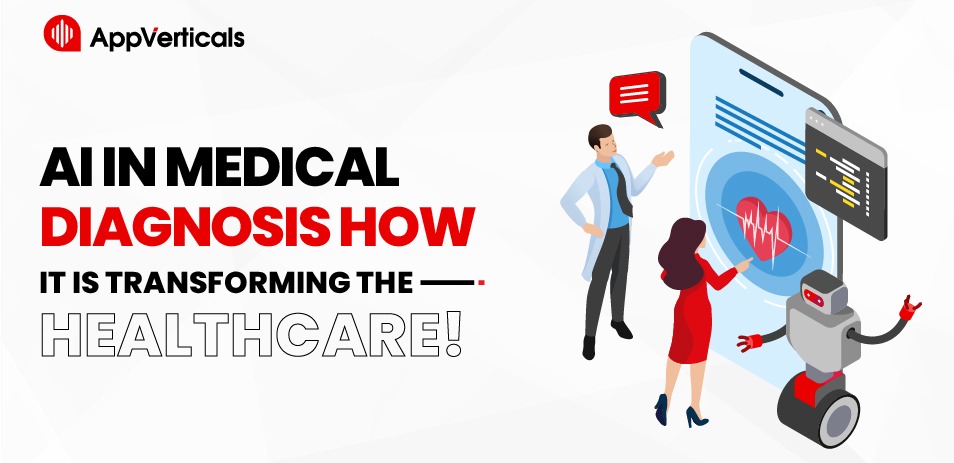Cloud computing is changing how healthcare works. Doctors and nurses can now access patient records quickly and easily, no matter where they are. This technology helps healthcare providers store and analyze large amounts of patient data, making it easier to provide faster and better care.
One big advantage of cloud computing in healthcare is that it makes important information more accessible. With cloud storage in healthcare, doctors don’t need to be in a specific location or use one device to view medical records.
The global healthcare cloud computing market size was USD 61.80 billion in 2023 and is predicted to grow from USD 69.80 billion in 2024 to approximately USD 210.51 billion by 2033, a study published by Towards Healthcare a sister firm of Precedence Statistics. The market is expected to expand at the fastest CAGR of 13.05% between 2024 and 2034.
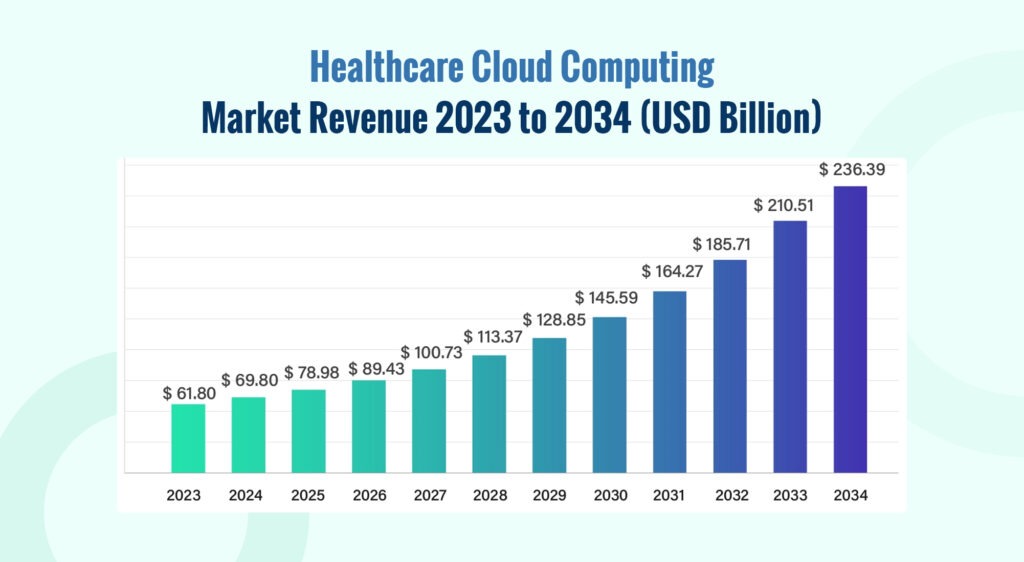
Even, if you’re a healthcare professional, having a healthcare app would make you connect with patients conveniently. Just consult with the best app development company to make a healthcare personalized app for you. Because cloud technology is making healthcare more efficient and effective, whether it enables remote care through cloud storage or supports personalized treatment plans.
Let’s discuss it in detail!
What is Cloud Computing?
Cloud computing in healthcare has made it easier for doctors and hospitals to manage large amounts of sensitive information while keeping it secure.
There are three types of cloud technology in healthcare:
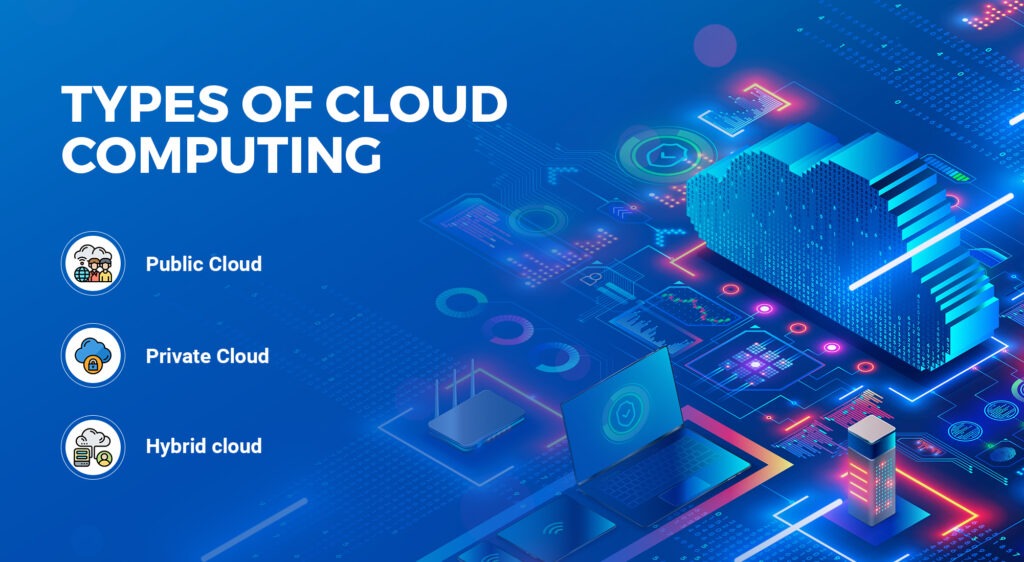
- Public Cloud: This service is shared by multiple users and accessed through the Internet. It’s an affordable option that allows healthcare providers to store large amounts of data. Hospitals can use public clouds to keep patient records and share information with other medical teams quickly.
- Private Cloud: A private cloud is used by just one organization. It offers better control and security, which is important when dealing with private patient information. Healthcare providers can ensure that sensitive data stays protected with a private cloud.
- Hybrid Cloud: A hybrid cloud mixes the public and private cloud. Hospitals can keep sensitive patient data on a private cloud and store other, less critical information on the public cloud. This gives them the best of both worlds—security and flexibility.
Also Read: 11 Impactful Healthcare Startup Ideas!
Benefits of Cloud Technology in Healthcare
Data Management and Accessibility in Healthcare
An important advantage is remote access. With cloud-based systems, healthcare workers can look at patient records from anywhere using their mobile devices or healthcare apps. Quick access to records ensures healthcare providers can give timely and accurate care, whether they’re in the clinic or seeing patients online.
Data security is crucial in healthcare, and cloud technology offers better protection. Cloud systems often use strong encryption to keep patient data safe and comply with healthcare laws like HIPAA. Cloud storage solutions help ensure sensitive information remains secure while still being easy for authorized people to access.
Using cloud computing for healthcare leads to better data management, easy access, and stronger security. As more healthcare organizations adopt this technology, the way they provide care continues to improve, benefiting both providers and patients.
Enhancing Collaboration Between Healthcare Providers
Cloud computing helps healthcare providers work better together. One major benefit is real-time information sharing. With cloud technology in healthcare, doctors and nurses can access and update patient information instantly. This fast access leads to better teamwork and improved patient care.
For example, if a doctor needs to consult a specialist, they can share test results and medical histories right away, ensuring everyone involved has the same information.
Cloud computing also makes telemedicine easier. Patients can connect with their doctors through video calls or messaging without having to go to the hospital. This is especially helpful for people living in remote areas or those with difficulty traveling.
Furthermore, cloud-based healthcare apps improve communication between doctors and patients. These apps allow healthcare providers to monitor patients’ health continuously and send alerts if any issues arise. This ongoing communication ensures that patients get timely care, which can lead to better health outcomes.
Cost Efficiency and Scalability for Healthcare Organizations
By moving to the cloud, providers can reduce their need for expensive on-premise IT infrastructure. This shift lowers operational costs and frees up funds for other important areas, like patient care. Instead of investing in hardware and maintenance, healthcare providers can focus on what truly matters: their patients.
Another advantage of cloud technology in healthcare is its scalability. As a healthcare organization grows, its needs change. Cloud computing allows these organizations to adjust their services easily. They can increase or decrease resources without large upfront investments.
Additionally, many cloud solutions use a pay-as-you-go model. This means that healthcare providers only pay for the resources they actually use. This approach makes budgeting simpler and helps organizations manage their expenses effectively.
Driving Innovations in Healthcare
Cloud computing also supports Internet of Things (IoT) devices and wearables. These gadgets send real-time data, which helps doctors monitor patients better.
For example, a smartwatch can track heart rate and send the information to healthcare providers immediately. This quick sharing of data helps doctors make important decisions quickly.
Improving Patient Outcomes with Cloud-Based Solutions
With cloud-based diagnostic tools and Electronic Health Records (EHR), doctors can make faster and more accurate diagnoses. These tools also help healthcare teams share information quickly, allowing for quicker treatment.
Another big benefit of cloud technology in healthcare is personalized patient care. By analyzing patient data efficiently, healthcare providers can create customized treatment plans.
Also Read: Benefit of having a healthcare app
Challenges and Considerations in Cloud Computing for Healthcare
As healthcare organizations switch to cloud computing, they face some important challenges.
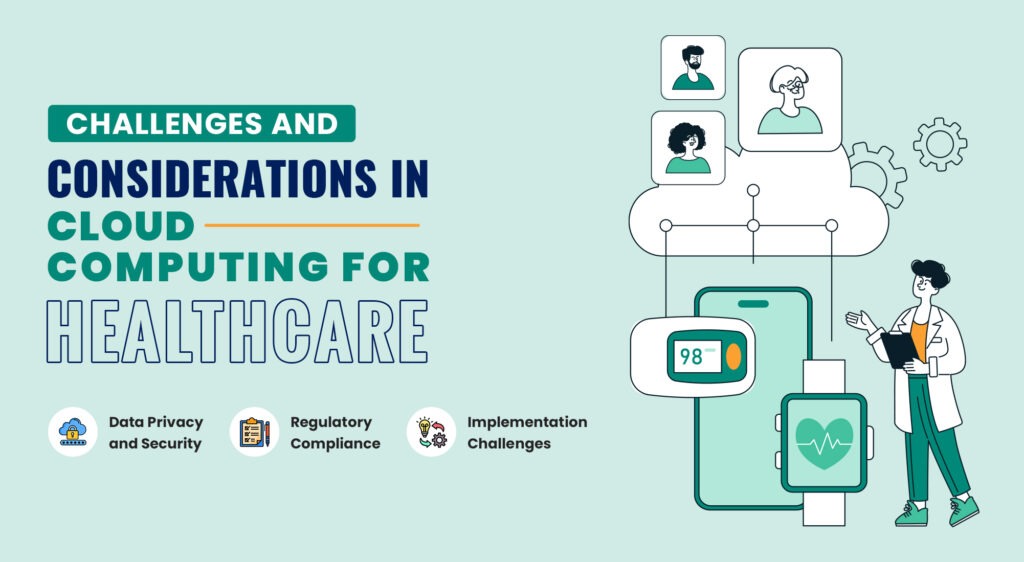
Data Privacy and Security
One big concern is data privacy and security. It’s crucial to keep patient information safe. Healthcare providers must use strong security measures like encryption and access controls. These tools help make sure that only the right people can see sensitive information, easing worries about possible data breaches.
Regulatory Compliance
Another important issue is regulatory compliance. Healthcare providers must follow strict rules like HIPAA (Health Insurance Portability and Accountability Act) when using cloud services. This means they need to ensure their cloud providers are also following these rules. Regular checks, training, and monitoring are necessary to stay compliant and protect patient data.
Implementation Challenges
Moving to cloud-based systems can also create implementation challenges. Many healthcare organizations find it hard to cover the initial costs of switching to the cloud. While saving money in the long run is possible, the upfront costs can be a barrier. Plus, staff training is very important. Employees need to learn how to use new cloud-based tools and processes. This can take time and resources that some organizations might not have.
Even with these challenges, cloud computing’s impact on healthcare can be significant. By addressing privacy concerns, ensuring compliance, and investing in training, healthcare organizations can enjoy the benefits of cloud technology.
Also Read: Healthcare app development
5 Top Healthcare Apps Using Cloud Computing
Many healthcare apps use cloud technology to provide better services. Here are five popular healthcare apps that use cloud computing:
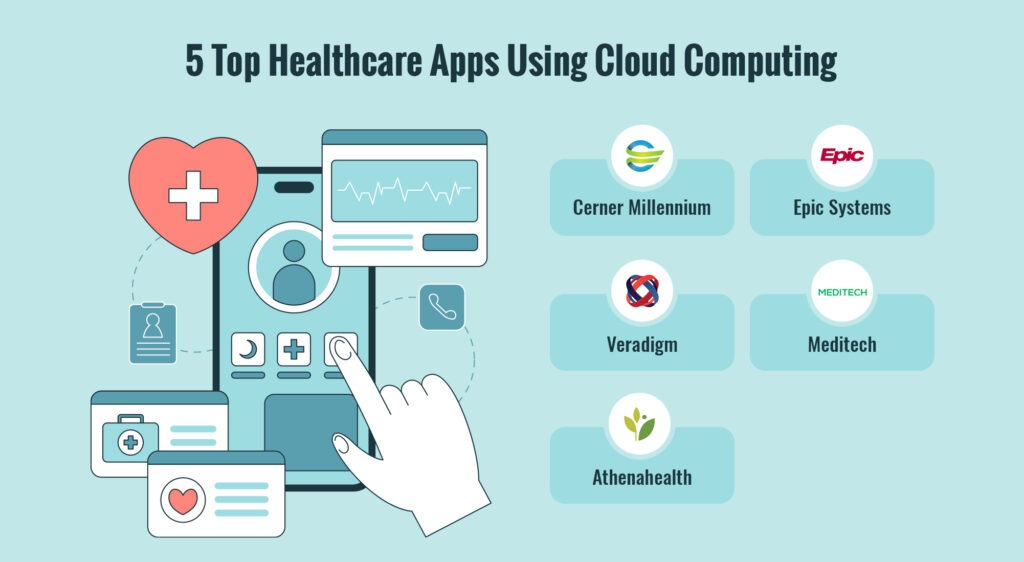
1. Cerner Millennium
Cerner Millennium is an electronic health record (EHR) system used by many hospitals and clinics. This app helps doctors and nurses share patient information quickly and easily. With Cerner, healthcare providers can look at a patient’s medical history, lab results, and treatment plans all in one place.
Cerner also connects to health devices, allowing doctors to see important health data in real time and make quick decisions about patient care.
Overall, Cerner Millennium helps healthcare teams work better together and provides faster treatment for patients.
2. Epic Systems
Epic Systems is one of the most well-known EHR systems in the United States. It allows healthcare providers to access patient information from different locations. One key feature of Epic is the MyChart app. This app lets patients check their health records, schedule appointments, and message their doctors.
Overall, Epic makes it easy for patients to get their health information safely using cloud technology.
3. Allscripts
Allscripts offers a range of healthcare solutions, including EHR and practice management tools. With Allscripts, healthcare providers can access patient records anytime and anywhere. This cloud-based platform helps doctors and nurses share information easily.
Allscripts also includes a feature that helps healthcare providers analyze patient data. This can help them spot health trends and adjust treatments for better care.
Overall, Allscripts makes it easier for healthcare teams to work together and improve patient outcomes.
4. Meditech
Meditech is a popular EHR provider that uses cloud computing to help hospitals manage patient care. Its system allows healthcare professionals to access patient information quickly. This is important for making timely decisions about treatment.
Meditech’s user-friendly design makes it easy for doctors and nurses to find what they need. Cloud technology also helps healthcare organizations lower costs by reducing the need for expensive IT equipment.
Overall, Meditech ensures that everyone on the healthcare team can access the information they need to provide quality care.
5. Athenahealth
Athenahealth is a cloud-based app that offers EHR, billing services, and practice management tools. This app helps healthcare providers run their practices more efficiently while focusing on patient care. Athenahealth’s cloud features allow doctors and staff to access patient records easily.
The Athenahealth app also includes tools for patient engagement. It can send reminders for appointments and allow patients to message their healthcare providers.
Overall, Athenahealth’s this kind of communication helps patients stay connected and involved in their care.
Cost to Make a Healthcare App With Cloud Computing
| Cost Factor | Description | Estimated Cost Range |
| Development Team | Hiring a skilled team of developers, designers, and project managers. | $50,000 – $250,000 |
| Cloud Hosting | Monthly fees for cloud services (e.g., AWS, Azure) based on storage and usage. | $100 – $1,000 per month |
| Compliance and Security | Implementing security measures and ensuring compliance with regulations like HIPAA. | $5,000 – $20,000 |
| Maintenance and Updates | Regular maintenance, updates, and customer support after launch. | $15,000 – $50,000 per year |
| Features and Integrations | Costs vary based on features like EHR integration, patient portals, and telehealth capabilities. | $20,000 – $100,000 |
| Marketing | Promoting the app through various channels to reach potential users. | $10,000 – $50,000 |
| User Testing | Gathering feedback from real users to improve app functionality and usability. | $5,000 – $15,000 |
How AppVerticals Can Help You Make a Top-Notch Healthcare App?

AppVerticals, top mobile app development company in Dallas, is an expert in building high-quality healthcare apps that use cloud technology. Here’s how we can help you create a great healthcare app:
- Skilled Development Team: Our team includes experienced developers, designers, and project managers. We understand the healthcare industry and can create custom solutions that perfectly suit your needs.
- Cloud Infrastructure: We use the latest cloud technology to make your app scalable, secure, and cost-effective.
- Data Privacy and Security: We follow strict rules to keep sensitive information safe and comply with regulations like HIPAA. We use strong security measures, including encryption and access controls, to guard your data.
- User-Friendly Design: Our design team makes sure the app is easy to use for both healthcare providers and patients, enhancing their experience.
- Integration with Existing Systems: We are great at connecting your app with current healthcare systems, such as Electronic Health Records (EHR). This helps with real-time data sharing and improves patient care.
- Ongoing Support and Maintenance: After your app is live, AppVerticals offers continuous support and maintenance. We provide regular updates and troubleshooting to ensure your app stays current and works well.
- Custom Solutions: We work closely with you to create a tailored healthcare app that meets your specific goals and helps it stand out in the market.
Bottom Line!
Cloud computing is like a super tool that’s helping healthcare get better. It makes it easier to store and share patient information, helps doctors work together, and lets people use new and cool healthcare apps.
Because of cloud computing, healthcare is becoming more modern and helpful. It’s making a big difference in how we get medical care. As technology keeps getting better, we can expect even more amazing things to happen in healthcare.
Need Further Assistance? Want the Best Competitive Healthcare App With Cloud Features? Contact Us!

